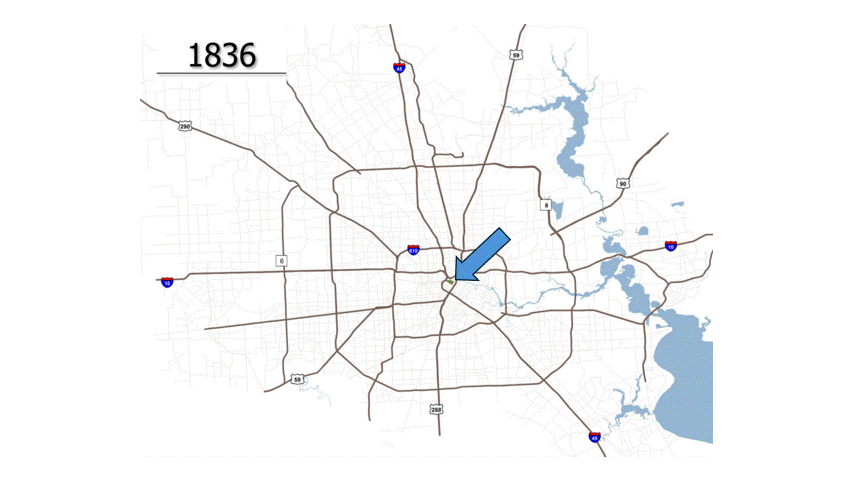Texas municipal annexation reform has steadily progressed since Houston’s unpopular annexation of Kingwood in 1996. As suburban populations grew, so did frustrations with the far afield city halls that governed them.
In 2017, the Texas Legislature passed SB 6. With few exceptions, SB 6 stripped cities located in the most populous counties of their ability to forcibly annex land. In 2019, the Legislature passed HB 347 expanding SB 6, and banning involuntary annexations for all Texas cities. Although voluntary annexations can still be accomplished through agreements or elections, these instances are limited. Thus, after 2019 the continued utility of the ETJ, the half to five-mile regulatory area surrounding a city’s limits, began to be questioned.

The Growth of Houston – City of Houston Planning & Development Department
The policy for ETJ regulation is that, in anticipation of eventual annexation, cities can require uniform standards for platting, development and infrastructure so these areas can be integrated with existing in-city development and utilities. Still, following the 2017 and 2019 reforms, cities continued to impose ETJ regulations that went well beyond what was necessary given the decreased likelihood that ETJ land would be annexed. These regulations impaired landowners’ rights to utilize their property, stymied development, and added significant cost to an already pricey housing market.
Entering the 88th Legislative Session, there was much discussion of ETJ reform. Proposals included abolishing the ETJ, limiting its expansion, and allowing landowners to choose whether their land would remain in the ETJ. The plethora of bills filed on the subject soundly reflected these discussions. These bills were filtered through the Senate Local Government Committee, chaired by Senator Paul Bettencourt (R–Houston), and the House Land and Resource Management Committee, chaired by Representative DeWayne Burns (R–Cleburne). Through the adept work of these Chairmen, and with the critical help of Representative Cecil Bell (R-Magnolia) and Representative Mike Schofield (R–Katy), both of whom worked on annexation and ETJ reform for years, SB 2038 became the lead bill, was sent to the Governor on the early date of May 9, 2023, and eventually signed into law on May 19, 2023.

SB 2038 requires the removal of land from the ETJ upon submission of a landowner petition. Upon receipt, a city must release the land from its ETJ, failing which, the land is deemed released. Similarly, residents may also petition for a removal election, held and paid for by the city. SB 2038 further provides that any area excluded cannot be included in another ETJ or reincluded in the excluded ETJ. Finally, it provides that annexations after January 1, 2023, no longer expand ETJs as it previously had.
SB 2038 is the biggest landowner rights bill in recent memory. It gives landowners a choice and unburdens property from often unnecessary and costly regulations. Landowners, armed with the power of choice, are no longer forced to submit to the regulations of a city that is not interested in providing service. Cities are now incentivized to come to the table with services in hand if they want to regulate ETJ land. Although a legal challenge attacking the constitutionality of SB 2038 is pending, it is widely expected that landowners will continue to exercise their right to exit the ETJ during the pendency of the challenge and that it will be resolved in favor of SB 2038.
Written by Howard Cohen
Chair, Government Affairs Committee
Published March 4, 2024

